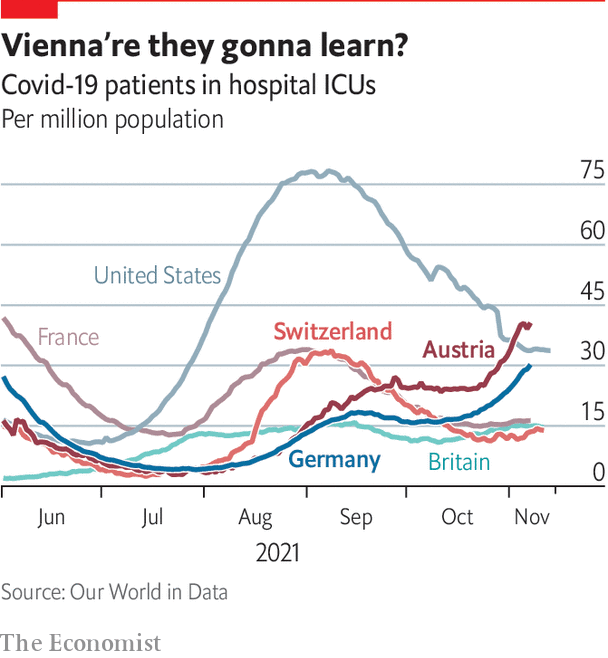The city of Berlin on November 15th banned the unvaccinated from restaurants, bars, cinemas, theatres, concert halls and other entertainment sites, in an expansion of the capital’s “2G” (geimpft or genesen—vaccinated or recovered) rule. In some places even the vaccinated or immune must be tested before entry. Outdoor events with more than 2,000 people are also off-limits for the unjabbed.
As caseloads have risen, it has not helped that Germany has been virtually leaderless since elections at the end of September. Angela Merkel, the departing chancellor, Olaf Scholz, her likely successor, and all 16 state premiers will at last meet on November 18th to discuss new measures to contain the pandemic. Most expect something like the imposition of Berlin’s 2G rule to the entire country, but no new lockdown. Germany’s “state of epidemic emergency”, which permits the government to impose a national lockdown or close schools, expires on November 25th—and the likely incoming government coalition of Social Democrats, Greens and Free Democrats under Mr Scholz does not want to renew it. (Mrs Merkel’s Christian Democrats are campaigning for renewal.)
In neighbouring Austria the situation is even grimmer. The seven-day infection rate is more than 800 per 100,000 people, and hospitals are cancelling non-emergency surgery. Though the government intended to wait until 600 beds in intensive-care wards were occupied by covid-19 patients, it has acted before reaching that alarming milestone. From November 15th it has imposed a ten-day lockdown on unvaccinated people aged 12 or over. Those who cannot prove that they are either fully vaccinated or immune through recovery from a past infection may leave their home only for essential reasons, such as going to work or to buy groceries—or to get a jab. People breaking the rules face fines starting at about €500 ($572); businesses will have to pay €3,000. Groups conspiring to evade regulations could be clobbered for €30,000.
“We must raise the vaccination rate. It is shamefully low,” said Alexander Schallenberg, the chancellor, on November 14th. Roughly 65% of Austria’s population are fully vaccinated. The right-wing Freedom Party, which gets around a fifth of votes at national elections, is the mouthpiece of anti-vaxxers. Herbert Kickl, the party’s boss, rails against Austria’s “covid-apartheid”. He is calling for a demonstration in Vienna against the new measures on November 20th and is threatening to sue the government at the Constitutional Court.
Across the border in Switzerland citizens will vote in a referendum on November 28th on codifying the federal government’s emergency pandemic powers. Opponents are especially vocal in German-speaking cantons; Freiheitstrychler, who describe themselves as the original Swiss, are particularly prominent. (Freiheit means “freedom”; they carry trycheln, the giant cowbells that are a folkloric Swiss symbol.)
The referendum particularly concerns the Swiss covid certificate, which has been compulsory since September 13th for admission to restaurants, gyms, cinemas, and big cultural and sports events. The populist Swiss People’s Party (SVP), the country’s strongest, is campaigning against the emergency powers. According to a recent poll 51% of its supporters are unvaccinated.
The Swiss government (a seven-strong council on which the SVP occupies two seats) last week launched an unprecedented vaccination drive with mobile inoculation centres, a vaccination “village” at the main railway station in Zurich and in-person or telephone counselling. Only 65% of the population are fully vaccinated. The government is unlikely to win the Trychler over. But it hopes to persuade some reluctant Swiss that getting jabbed is a price worth paying to visit their local restaurant for rösti.
Full story here Are you the author? Previous post See more for Next post
Tags: Featured,newsletter
































